- Home
- Michael Swanwick
Not So Much, Said the Cat Page 6
Not So Much, Said the Cat Read online
Page 6
“Oh Jesus.” Hank pulled his gloves off, shoved up his glasses, and ground his palms into his eyes. “You’ve got your war at last, haven’t you? You’ve picked a fight with creatures that have tremendous technological superiority over us, and they don’t even live here! All they have to do is drop a big enough rock into our atmosphere and there’ll be a mass extinction the likes of which hasn’t been seen since the dinosaurs died out. They won’t care. It’s not their planet!”
Evelyn’s face twisted into an expression he hadn’t known it could form until just before the end of their marriage, when everything fell apart. “Stop being such an ass,” she said. Then, talking fast and earnestly, “We didn’t cause the accident. It was just dumb luck it happened, but once it did we had to take advantage of it. Yes, the Worms probably have the technology to wipe us out. So we have to deal with them. But to deal with them we have to understand them, and we do not. They’re a mystery to us. We don’t know what they want. We don’t know how they think. But after tonight we’ll have a little better idea. Provided only that you get back to work.”
Hank went to the table and pulled a new pair of gloves off the roll. “Okay,” he said. “Okay.”
“Just keep in mind that it’s not just my ass that’s riding on this,” Evelyn said. “It’s yours and everyone’s you know.”
“I said okay!” Hank took a long breath, calming himself. “Next thing to do is cut this sucker open.” He picked up a power saw. “This is bad technique, but we’re in a hurry.” The saw whined to life, and he cut through the leathery brown skin from beak to anus. “All right, now we peel the skin back. It’s wet-feeling and a little crunchy. The musculature looks much like that of a Terrestrial annelid. Structurally, that is. I’ve never seen anything quite that color black. Damn! The skin keeps curling back.”
He went to his tackle box and removed a bottle of fishhooks. “Here. We’ll take a bit of nylon filament, tie two hooks together, like this, with about two inches of line between them. Then we hook the one through the skin, fold it down, and push the other through the cloth on the gurney. Repeat the process every six inches on both sides. That should hold it open.”
“Got it.” Evelyn set to work.
Some time later they were done, and Hank stared down into the opened Worm. “You want speculation? Here goes: This thing moves through the mud, or whatever the medium is there, face-first and blind. What does that suggest to you?”
“I’d say that they’d be used to coming up against the unexpected.”
“Very good. Haul back on this, I’m going to cut again. . . . Okay, now we’re past the musculature and there’s a fluffy mass of homogeneous stuff, we’ll come back to that in a minute. Cutting through the fluff . . . and into the body cavity, and it’s absolutely chockablock with zillions of tiny little organs.”
“Let’s keep our terminology at least vaguely scientific, shall we?” Evelyn said.
“Well, there are more than I want to count. Literally hundreds of small organs under the musculature, I have no idea what they’re for but they’re all interconnected with veinlike tubing in various sizes. This is ferociously more complicated than human anatomy. It’s like a chemical plant in here. No two of the organs are the same so far as I can tell, although they all have a generic similarity. Let’s call them alembics, so we don’t confuse them with any other organs we may find. I see something that looks like a heart maybe, an isolated lump of muscle the size of my fist, there are three of them. Now I’m cutting deeper. . . . Holy shit!”
For a long minute, Hank stared into the opened alien corpse. Then he put the saw down on the gurney and, shaking his head, turned away. “Where’s that coffee?” he said.
Without saying a word, Evelyn went to the coffee station and brought him his cold cup.
Hank yanked his gloves, threw them in the trash, and drank.
“All right,” Evelyn said, “so what was it?”
“You mean you can’t see—no, of course you can’t. With you, it was human anatomy all the way.”
“I took invertebrate biology in college.”
“And forgot it just as fast as you could. Okay, look: Up here is the beak, semiretractable. Down here is the anus. Food goes in one, waste comes out the other. What do you see between?”
“There’s a kind of a tube. The gut?”
“Yeah. It runs straight from the mouth to the anus, without interruption. Nothing in between. How does it eat without a stomach? How does it stay alive?” He saw from Evelyn’s expression that she was not impressed. “What we see before us is simply not possible.”
“Yet here it is. So there’s an explanation. Find it.”
“Yeah, yeah.” Glaring at the Worm’s innards, he drew on a new pair of gloves. “Let me take a look at that beak again. . . . Hah. See how the muscles are connected? The beak relaxes open, aaand—let’s take a look at the other end—so does the anus. So this beast crawls through the mud, mouth wide open, and the mud passes through it unhindered. That’s bound to have some effect on its psychological makeup.”
“Like what?”
“Damned if I know. Let’s take a closer look at the gut. . . . There are rings of intrusive tissue near the beak one-third of the way in, two-thirds in, and just above the anus. We cut through and there is extremely fine structure, but nothing we’re going to figure out tonight. Oh, hey, I think I got it. Look at these three flaps just behind. . . .”
He cut in silence for a while. “There. It has three stomachs. They’re located in the head, just behind the first ring of intrusive tissue. The mud or whatever is dumped into this kind of holding chamber, and then there’s this incredible complex of muscles, and—how many exit tubes?—this one has got, um, fourteen. I’ll trace one, and it goes right to this alembic. The next one goes to another alembic. I’ll trace this one and it goes to—yep, another alembic. There’s a pattern shaping up here.
“Let’s put this aside for the moment, and go back to those masses of fluff. Jeeze, there’s a lot of this stuff. It must make up a good third of the body mass. Which has trilateral symmetry, by the way. Three masses of fluff proceed from head to tail, beneath the muscle sheaf, all three connecting about eight inches below the mouth, into a ring around the straight gut. This is where the arms or manipulators or screwdrivers or whatever they are grow. Now, at regular intervals the material puts out little arms, outgrowths that fine down to wirelike structures of the same material, almost like very thick nerves. Oh God. That’s what it is.” He drew back, and with a scalpel flensed the musculature away to reveal more of the mass. “It’s the central nervous system. This thing has a brain that weighs at least a hundred pounds. I don’t believe it. I don’t want to believe it.”
“It’s true,” Evelyn said. “Our people in Bethesda have done slide studies. You’re looking at the thing’s brain.”
“If you already knew the answer, then why the hell are you putting me through this?”
“I’m not here to answer your questions. You’re here to answer mine.”
Annoyed, Hank bent over the Worm again. There was rich stench of esters from the creature, pungent and penetrating, and the slightest whiff of what he guessed was putrefaction. “We start with the brain and trace one of the subordinate ganglia inward. Tricky little thing, it goes all over the place, and ends up right here, at one of the alembics. We’ll try another one, and it . . . ends up at an alembic. There are a lot of these things. Let’s see—hey—here’s one that goes to one of the structures in the straight gut. What could that be? A tongue! That’s it, there’s a row of tongues just within the gut, and more to taste the medium flowing through, yeah. And these little flapped openings just behind them open when the mud contains specific nutrients the worm desires. Okay, now we’re getting somewhere, how long have we been at this?”
“About an hour and a half.”
“It feels like longer.” He thought of getting some more coffee, decided against it. “So what have we got here? All that enormous brain mass�
�what’s it for?”
“Maybe it’s all taken up by raw intelligence.”
“Raw intelligence! No such thing. Nature doesn’t evolve intelligence without a purpose. It’s got to be used for something. Let’s see. A fair amount is taken up by taste, obviously. It has maybe sixty individual tongues, and I wouldn’t be surprised if its sense of taste were much more detailed than ours. Plus all those little alembics performing godknows-what kind of chemical reactions.
“Let’s suppose for a minute that it can consciously control those reactions, that would account for a lot of the brain mass. When the mud enters at the front, it’s tasted, maybe a little is siphoned off and sent through the alembics for transformation. Waste products are jetted into the straight gut, and pass through several more circles of tongues. . . . Here’s another observation for you: These things would have an absolute sense of the state of their own health. They can probably create their own drugs, too. Come to think of it, I haven’t come across any evidence of disease here.” The Worm’s smell was heavy, penetrating, pervasive. He felt slightly dizzy, shook it off.
“Okay, so we’ve got a creature that concentrates most of its energy and attention internally. It slides through an easy medium, and at the same time the mud slides through it. It tastes the mud as it passes, and we can guess that the mud will be in a constant state of transformation, so it experiences the universe more directly than do we.” He laughed. “It appears to be a verb.”
“How’s that?”
“One of Buckminster Fuller’s aphorisms. But it fits. The worm constantly transforms the universe. It takes in all it comes across, accepts it, changes it, and excretes it. It is an agent of change.”
“That’s very clever. But it doesn’t help us deal with them.”
“Well, of course not. They’re intelligent, and intelligence complicates everything. But if you wanted me to generalize, I’d say the Worms are straightforward and accepting—look at how they move blindly ahead—but that their means of changing things are devious, as witness the mass of alembics. That’s going to be their approach to us. Straightforward, yet devious in ways we just don’t get. Then, when they’re done with us, they’ll pass on without a backward glance.”
“Terrific. Great stuff. Get back to work.”
“Look, Evelyn. I’m tired and I’ve done all I can, and a pretty damned good job at that, I think. I could use a rest.”
“You haven’t dealt with the stuff near the beak. The arms or whatever.”
“Cripes.” Hank turned back to the corpse, cut open an edema, began talking. “The material of the arms is stiff and osseous, rather like teeth. This one has several moving parts, all controlled by muscles anchored alongside the edema. There’s a nest of ganglia here, connected by a very short route to the brain matter. Now I’m cutting into the brain matter, and there’s a small black gland, oops I’ve nicked it. Whew. What a smell. Now I’m cutting behind it.” Behind the gland was a small white structure, square and hard meshwork, looking like a cross between an instrument chip and a square of Chex cereal.
Keeping his back to Evelyn, he picked it up.
He put it in his mouth.
He swallowed.
What have I done? he thought. Aloud, he said, “As an operating hypothesis I’d say that the manipulative structures have been deliberately, make that consciously grown. There, I’ve traced one of those veins back to the alembics. So that explains why there’s no uniformity, these things would grow exterior manipulators on need, and then discard them when they’re done. Yes, look, the muscles don’t actually connect to the manipulators, they wrap around them.”
There was a sour taste on his tongue.
I must be insane, he thought.
“Did you just eat something?”
Keeping his expression blank, Hank said, “Are you nuts? You mean did I put part of this . . . creature . . . in my mouth?” There was a burning within his brain, a buzzing like the sound of the rising sun picked up on a radio telescope. He wanted to scream, but his face simply smiled and said, “Do you—?” And then it was very hard to concentrate on what he was saying. He couldn’t quite focus on Evelyn, and there were white rays moving starburst across his vision and.
When he came to, Hank was on the interstate, doing ninety. His mouth was dry and his eyelids felt gritty. Bright yellow light was shining in his eyes from a sun that had barely lifted itself up above over the horizon. He must have been driving for hours. The steering wheel felt tacky and gummy. He looked down.
There was blood on his hands. It went all the way up to his elbows.
The traffic was light. Hank had no idea where he was heading, nor any desire whatsoever to stop.
So he just kept driving.
Whose blood was it on his hands? Logic said it was Evelyn’s. But that made no sense. Hate her though he did—and the sight of her had opened wounds and memories he’d thought cauterized shut long ago—he wouldn’t actually hurt her. Not physically. He wouldn’t actually kill her.
Would he?
It was impossible. But there was the blood on his hands. Whose else could it be? Some of it might be his own, admittedly. His hands ached horribly. They felt like he’d been pounding them into something hard, over and over again. But most of the blood was dried and itchy. Except for where his skin had split at the knuckles, he had no wounds of any kind. So the blood wasn’t his.
“Of course you did,” Evelyn said. “You beat me to death and you enjoyed every minute of it.”
Hank shrieked and almost ran off the road. He fought the car back and then turned and stared in disbelief. Evelyn sat in the passenger seat beside him.
“You . . . how did. . . ?” Much as he had with the car, Hank seized control of himself. “You’re a hallucination,” he said.
“Right in one!” Evelyn applauded lightly. “Or a memory, or the personification of your guilt, however you want to put it. You always were a bright man, Hank. Not so bright as to be able to keep your wife from walking out on you, but bright enough for government work.”
“Your sleeping around was not my fault.”
“Of course it was. You think you walked in on me and Jerome by accident? A woman doesn’t hate her husband enough to arrange something like that without good reason.”
“Oh god, oh god, oh god.”
“The fuel light is blinking. You’d better find a gas station and fill up.”
A Lukoil station drifted into sight, so he pulled into it and stopped the car by a full service pump. When he got out, the service station attendant hurried toward him and then stopped, frozen.
“Oh no,” the attendant said. He was a young man with sandy hair. “Not another one.”
“Another one?” Hank slid his card through the reader. “What do you mean another one?” He chose high-test and began pumping, all the while staring hard at the attendant. All but daring him to try something. “Explain yourself.”
“Another one like you.” The attendant couldn’t seem to look away from Hank’s hands. “The cops came right away and arrested the first one. It took five of them to get him into the car. Then another one came and when I called, they said to just take down his license number and let him go. They said there were people like you showing up all over.”
Hank finished pumping and put the nozzle back on its hook. He did not push the button for a receipt. “Don’t try to stop me,” he said. The words just came and he said them. “I’d hurt you very badly if you did.”
The young man’s eyes jerked upward. He looked spooked. “What are you people?”
Hank paused, with his hand on the door. “I have no idea.”
“You should have told him,” Evelyn said when he got back in the car. “Why didn’t you?”
“Shut up.”
“You ate something out of that Worm and it’s taken over part of your brain. You still feel like yourself, but you’re not in control. You’re sitting at the wheel but you have no say over where you’re going. Do you?”
�
��No,” Hank admitted. “No, I don’t.”
“What do you think it is—some kind of super-prion? Like mad cow disease only faster than fast? A neuroprogrammer, maybe? An artificial overlay to your personality that feeds off of your brain and shunts your volition into a dead end?”
“I don’t know.”
“You’re the one with the imagination. This would seem to be your sort of thing. I’m surprised you’re not all over it.”
“No,” Hank said. “No, you’re not at all surprised.”
They drove on in silence for a time.
“Do you remember when we first met? In med school? You were going to be a surgeon then.”
“Please. Don’t.”
“Rainy autumn afternoons in that ratty little third-floor walk-up of yours. With that great big aspen with the yellow leaves outside the window. It seemed like there was always at least one stuck to the glass. There were days when we never got dressed at all. We’d spend all day in and out of that enormous futon you’d bought instead of a bed, and it still wasn’t large enough. If we rolled off the edge, we’d go on making love on the floor. When it got dark, we’d send out for Chinese.”
“We were happy then. Is that what you want me to say?”
“It was your hands I liked best. Feeling them on me. You’d have one hand on my breast and the other between my legs and I’d imagine you cutting open a patient. Peeling back the flesh to reveal all those glistening organs inside.”
“Okay, now that’s sick.”
“You asked me what I was thinking once and I told you. I was watching your face closely, because I really wanted to know you back then. You loved it. So I know you’ve got demons inside you. Why not own up to them?”
He squeezed his eyes shut, but something inside him opened them again, so he wouldn’t run the car off the road. A low moaning sound arose from somewhere deep in his throat. “I must be in Hell.”

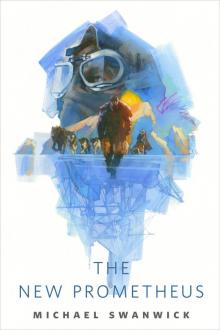 The New Prometheus
The New Prometheus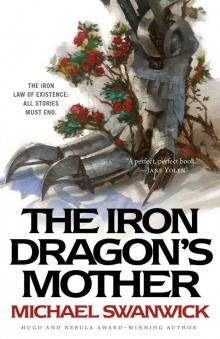 The Iron Dragon’s Mother
The Iron Dragon’s Mother The Mongolian Wizard Stories
The Mongolian Wizard Stories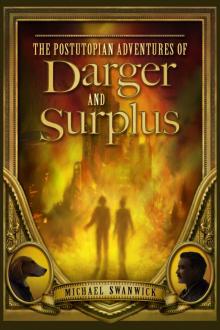 The Postutopian Adventures of Darger and Surplus
The Postutopian Adventures of Darger and Surplus Day of the Kraken
Day of the Kraken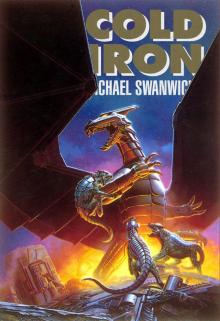 Cold Iron
Cold Iron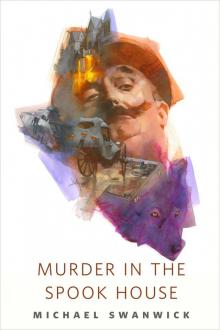 Murder in the Spook House: A Tor.com Original
Murder in the Spook House: A Tor.com Original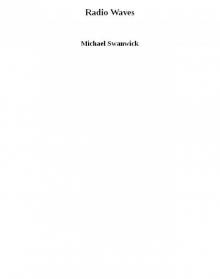 Radio Waves
Radio Waves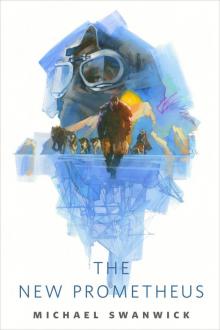 The New Prometheus: A Tor.com Original
The New Prometheus: A Tor.com Original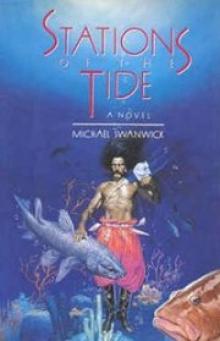 Stations of the Tide
Stations of the Tide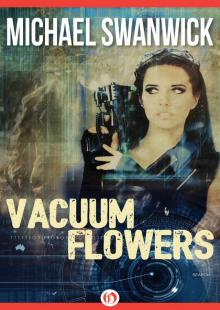 Vacuum Flowers
Vacuum Flowers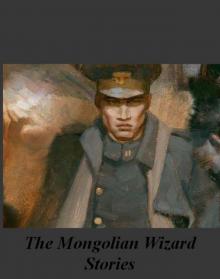 The Mongolian Wizard Stories (online stories 1-7)
The Mongolian Wizard Stories (online stories 1-7)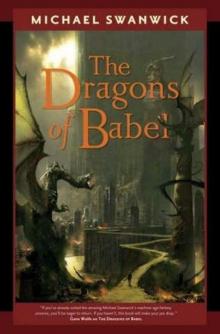 The Dragons of Babel
The Dragons of Babel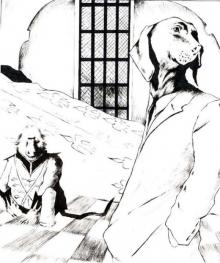 The Dog Said Bow-Wow
The Dog Said Bow-Wow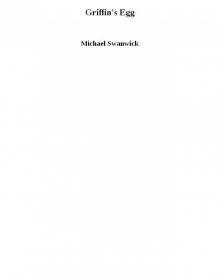 Griffin's Egg
Griffin's Egg The Best of Michael Swanwick
The Best of Michael Swanwick Not So Much, Said the Cat
Not So Much, Said the Cat In the Drift
In the Drift Vacumn Flowers
Vacumn Flowers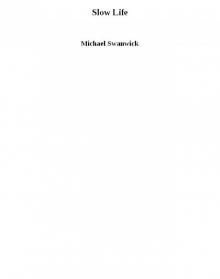 Slow Life
Slow Life The Wisdom Of Old Earth
The Wisdom Of Old Earth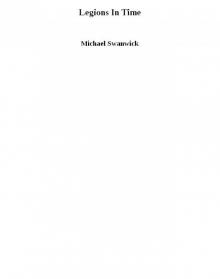 Legions In Time
Legions In Time Scherzo with Tyrannosaur
Scherzo with Tyrannosaur The Year's Best Science Fiction (2008 Edition)
The Year's Best Science Fiction (2008 Edition)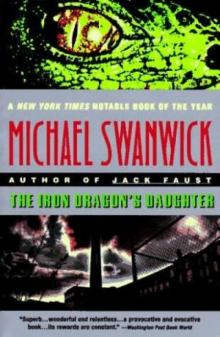 The Iron Dragon's Daughter
The Iron Dragon's Daughter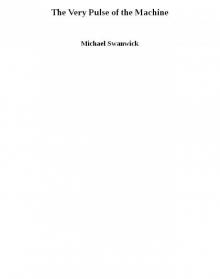 The Very Pulse of the Machine
The Very Pulse of the Machine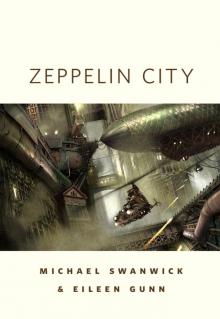 Zeppelin City
Zeppelin City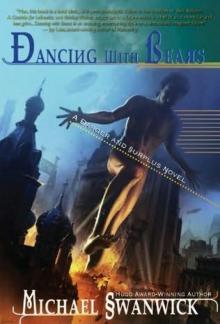 Dancing with Bears
Dancing with Bears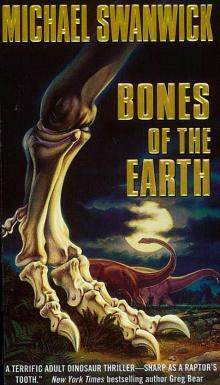 Bones of the Earth
Bones of the Earth Tales of Old Earth
Tales of Old Earth Trojan Horse
Trojan Horse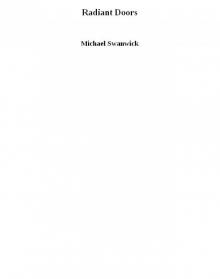 Radiant Doors
Radiant Doors